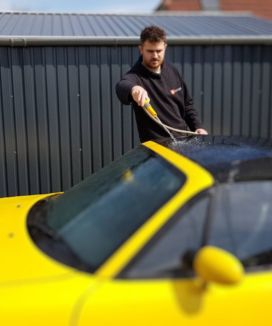How to Get Into Classic Cars: Investing and Enjoying
Table of Contents
Table of Contents
Many people are interested in getting into classic cars, but sometimes lack the knowledge of where to start, or are worried about the cost.
Although classic cars can be a significant investment in time, energy, and money, those that do take the plunge find them to be a fun and rewarding hobby.
Here at The Car Investor, we got started in the classic car market with just $9,000 (£8,000), so we have first-hand experience of how to get into the classic market on a budget.
Here are a few tips on how to get into classic cars, whether you’re interested in investing or just enjoying the ride.
What are some benefits of owning a classic car?
One of the great things about classic cars is that they can appreciate in value over time. If you take good care of your classic, it could be worth more money than you paid for it when the time comes to sell.
Classic cars are also a lot of fun to drive. They have more personality than modern cars, and driving one can be a truly unique experience.
They can also be a great conversation starter, and are sure to turn heads in the street. People are often curious about them, and you’ll find that owning a classic car can be a great way to meet new people and make new friends.
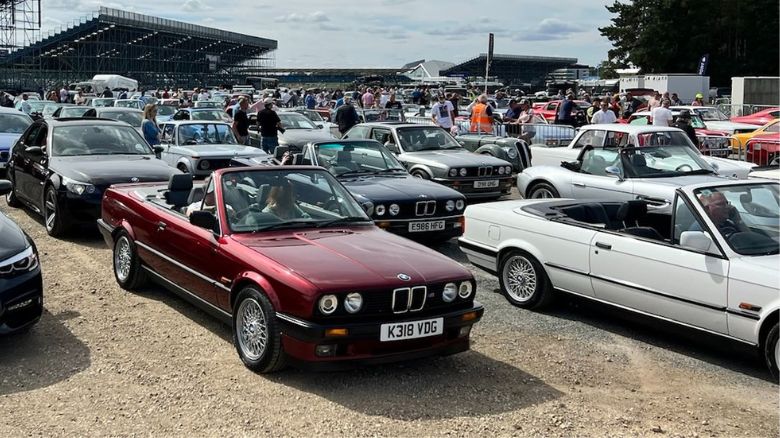
You can really immerse yourself in the classic car scene by joining a car club or attending car shows.
Of course, it’s not all fun and games – owning a classic car requires a lot of work. They’re not as reliable as modern cars, so you’ll need to be prepared to do some maintenance and repairs yourself if you want to save money.
You’ll also need to ensure you keep enough money to one side to cover any unexpected costs, and value appreciation isn’t a given – you could end up losing money in the long-run if you’re not careful.
How much money do you need to buy a classic car?
Classic cars come in all shapes and sizes, and therefore prices, so you can expect to pay anywhere from a few thousand dollars for a lower-end model to hundreds of thousands for a rare or iconic car.
Of course, it’s not only the purchase price that you’ll need to consider when buying a classic car, but also the ongoing costs of maintenance, repairs, and insurance.
If you’re new to the classic car market and want to keep costs down, having at least $10,000-$15,000 (£9,000-£13,000) in the bank is a good starting point. You should be able to find an entry-level car for this price, and have some left over to cover any unexpected costs.
Don’t use all of your spare cash to buy the car outright, though – remember to leave some money aside for the ongoing costs. We suggest holding around 25% of the cash you’ve set aside for your classic car fund in a reserve account to cover these costs without stress.
The pie chart below shows how we used our funds to buy our first classic car here at The Car Investor; a 1996 BMW 840Ci.
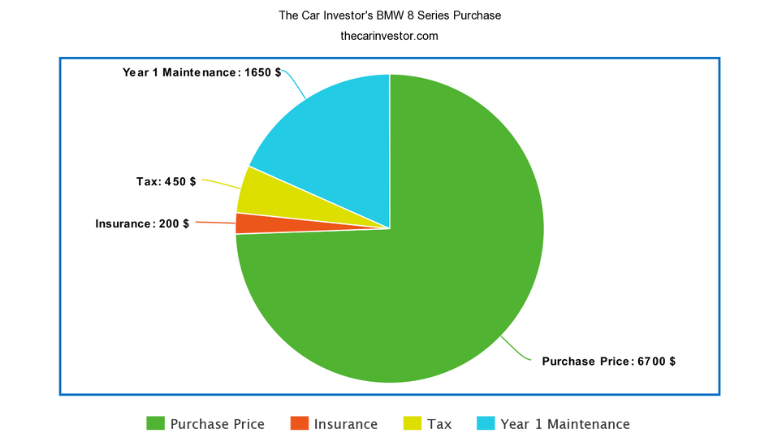
As you can see, we needed plenty of money in reserve to cover the costs of maintenance in the first year of ownership.
How to prepare for buying a classic car
Buying a classic car is very different to buying a modern car, and is also quite different to most other forms of investment. Here are some things that you’ll need to consider.
Where will you store it?
While it is possible to own a classic car without a garage, it’s definitely not recommended. If you don’t have somewhere warm and dry to store your car, it will be exposed to the elements and is more likely to suffer from premature wear and tear.
After spending your precious time, money, and effort on restoring or repairing your classic car, the last thing you’ll want is for it to start deteriorating due to the effects of the weather.
If you don’t have a garage at home, you will need to think about where to store it. There are other options available, such as:
- A portable garage
- A classic car storage facility
- Renting a garage
- A car bubble
However, each option comes with its own set of pros and cons. Renting a garage or using a classic car storage facility can be costly, and a temporary solution such as a car bubble or portable garage may not give your car the long-term protection it needs.
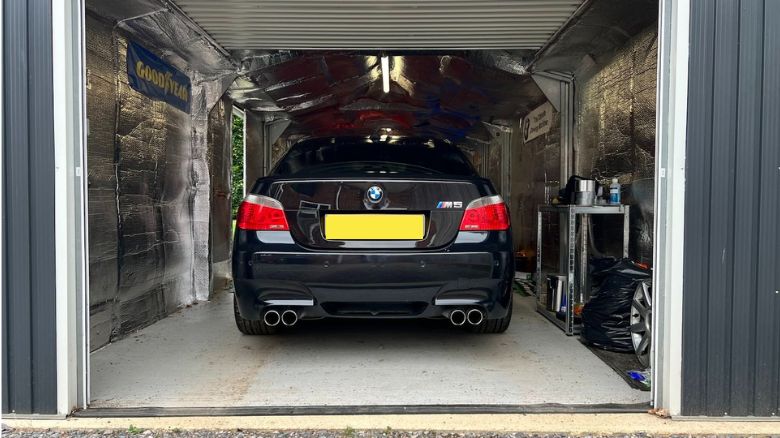
You also need to think about your car’s security. Classic cars can be targeted by thieves, so you’ll need to make sure it’s stored in a safe and secure location.
How will you care for it?
Classic cars require far more care and attention than their modern counterparts. You’ll need to be prepared to wash, wax, and polish your car regularly to keep it in top shape.
Cleaning and detailing is time-consuming and can be quite messy, but it’s an essential part of classic ownership. Every last detail needs to be tended to if you want your car to look its best, and be protected from the elements.
You’ll also need to think about how you’re going to keep your car running smoothly, given it may not be in use all the time. This includes everything from changing the oil regularly to checking the tyre pressures and making sure all the fluid levels are topped up.
Who will fix it when it goes wrong?
Many classic car owners choose to work on their cars themselves to save money. However, this isn’t always possible, and you may need to take your car to a specialist mechanic when something goes wrong.
If you’re not mechanically minded, you’ll need to factor in the cost of taking your car to a professional for regular servicing, or the time needed to learn how to work on the car yourself.
Regardless of whether you’re planning to get your hands dirty, it’s a good idea to locate a specialist car mechanic in your area before you buy a car. That way, you’ll know who to turn to if something big does go wrong.
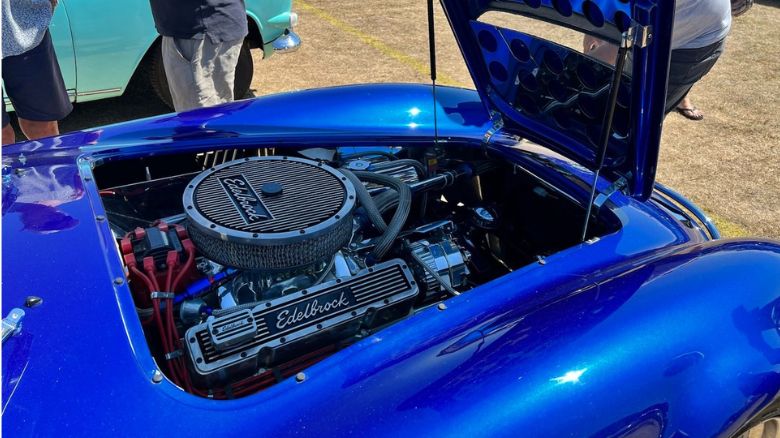
The mechanic could specialize generally in classic cars, or be an expert in the particular make or model that you’re looking to buy.
What will you do with it over the winter?
Classic cars don’t do well in the cold, wet winters that many of us are used to. The salt and grit on the roads can cause corrosion, while the cold weather can make it difficult to start the engine.
If you do live in a country that grits its roads in winter, you’ll need to take extra care of your car. Salt is the enemy of classic cars, and you’ll need to wash it off as soon as possible to prevent long-term damage.
Many classic car owners choose not to drive their cars during the winter months as a result of this. They simply deem it too much of a risk to their pride and joy.
If you do plan on using your car in winter, you’ll need to factor in the extra time and effort required to keep it clean and protected every time you take it out.
If you want to keep it in pristine condition, you might consider putting it into storage for the winter months. There are companies that specialize in storing classic cars, and they will be able to keep it safe and sound until the spring.
If you’re going to lay your car up for the winter at home, you’ll need to make sure it’s prepared properly. This includes considerations such as:
- Ensuring the humidity levels in the garage are low
- Putting the car on jack stands to prevent flat spots from forming on the tyres
- Disconnecting the battery to prevent it from draining
- Putting a cover over the car to protect it from dust and dirt
- Adding fuel stabilizer to the tank
If you do live in a country that experiences cold winters, these considerations are vital to prolonging the life of your car.
How do you get into the classic car market?
Once you’ve considered all of the points we’ve discussed so far in this article, you’ll need to start thinking about buying your first classic.
After setting your budget, you’ll want to:
- Decide the criteria you want your classic car to fill
- Create an initial shortlist of cars that fill those criteria
- Research each car thoroughly
- Narrow down your shortlist
- Start searching for the perfect classic
The research part of this process is essential for ensuring you stay within your budget, and you minimize the risk of choosing a car that’s likely to cost too much to run, or one that doesn’t satisfy your needs.
Depending on how much you’re spending and how specific your requirements are, it might be worth enlisting the help of a classic car dealer.
This is common for those buying more expensive cars, as dealers have the expertise and networks needed to source specific models.
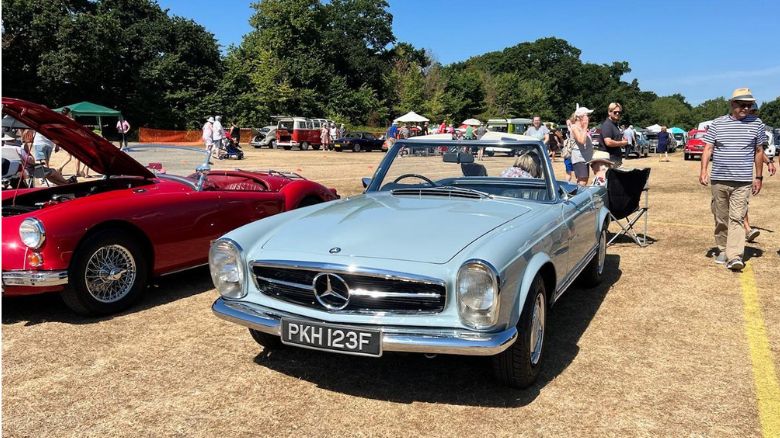
However, the vast majority of people starting out choose to do their own research online, and then buy their car through a private sale or auction.
Searching for your first classic car may take months, or even years, and there are likely to be plenty of viewings before you find a car you’re happy with.
Viewing multiple cars is important as it gives you a better understanding of what’s available on the market, and how much different cars are worth.
It will also help you to spot any common issues that you need to look out for, and will give you an opportunity to speak with the owners and get a feel for what it’s like to own the car in question.
Our beginner’s guide to buying a classic car goes into each step in more detail, so if you’re looking for more information, be sure to check it out.
In conclusion
Getting into classic cars can be a daunting task, but it’s one that’s well worth the effort if you’re passionate about all things automotive.
In this article we’ve discovered:
- Owning a classic car can be rewarding, but they require a lot of dedication
- Whatever your budget, be sure to keep some cash to one side as an emergency fund for when things need fixing
- Before buying, you will need to consider where to keep your car, how you will care for it, who will fix it when it goes wrong, and what you’ll do with it over the winter
- Getting into the classic car market requires a lot of research and patience
Overall, we can speak from experience when we say that getting into classic cars is a hugely rewarding process, both in terms of the enjoyment you’ll get from driving your car, and the friendships you’ll make along the way.
Not only that, but many classic cars appreciate in value over the years, so if you do your research and buy wisely, you may even make a profit further down the line.
ABOUT THE AUTHOR
Adam Chinn writes about the intersecting worlds of classic cars, driving pleasure, and smart investment strategies. Starting his journey at 26, he’s proven that one doesn’t need to be wealthy to begin investing in classic cars.
Adam’s insights have been recognized on platforms such as MoneyInc, Swagger Magazine, and Top Speed.
Your journey to smarter car investments starts here.
The latest classic car data analysis, news, and expert articles delivered straight to your inbox.
- Take the guesswork out of classic car investing
- Get the tools and strategies you need to take action
- Learn the market inside-out
- Make informed decisions with confidence
Register now to see the best and worst performers, every month
You can unsubscribe at any time


